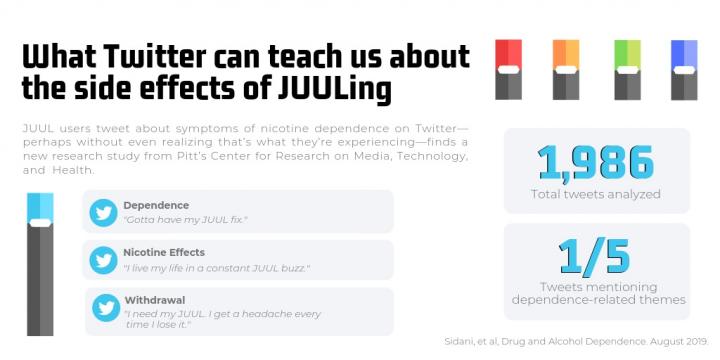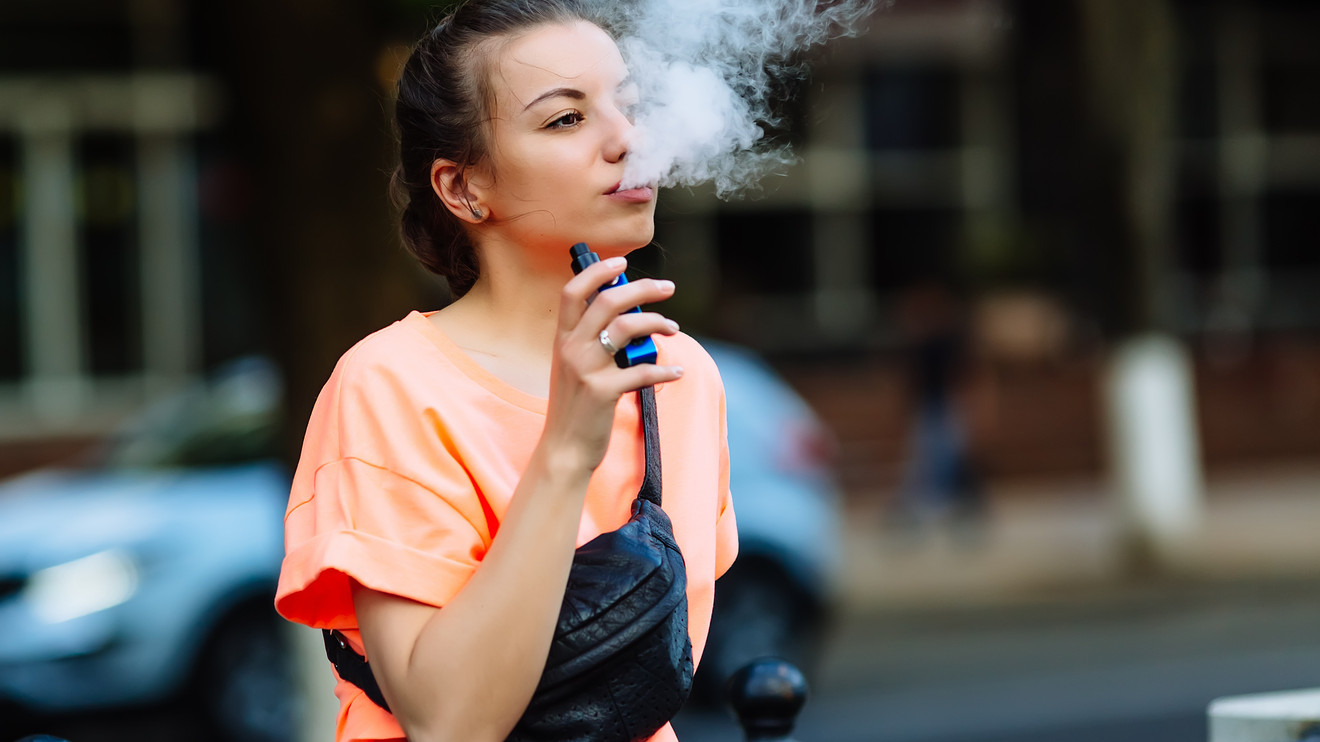Juul is getting burned on all sides.
On Monday, the FDA accused Juul Labs of illegally marketing its products with misleading claims that they were safer than cigarettes, and threatened to fine the company and seize its products if it doesn’t correct its actions.
And in another sign of the mounting scrutiny of e-cigarettes, the University of Pittsburgh released a study showing that addiction and negative side-effects are a major strain in social conversation about Juul usage.
The Pittsburgh study analyzed almost 2,000 posts from Juul users on Twitter TWTR, -2.55% that included keywords such as “juul,” “juuls” and “juuling” between April and June 2018, and found that one in five referenced addiction-related themes in their tweets, such as nicotine dependence, nicotine effects, and quitting Juul or withdrawal signs. “There is no headache like a ‘I lost my juul last week’ headache,” wrote one customer, for example. Another wrote, “I need my JUUL. I get a headache everytime I lose it.”
“We found many self-reported symptoms of nicotine dependence,” said co-author A. Everette James, director of the Pitt Health Policy Institute in a statement. “Because of the lack of public knowledge about the dependence risks, it makes sense that many people seemed surprised about experiencing symptoms of withdrawal when they could not use their device.”

Indeed, the FDA has accused Juul of deceptive marketing practices that led to this public misconception about e-cigarette safety in its warning letter to CEO Kevin Burns that was released Monday.
After reviewing Juul’s two days of testimony at the U.S. House in July, FDA investigators determined that Juul broke the law by selling or distributing its products “as modified risk tobacco products without an FDA order in effect that permits such sale or distribution.”
Acting FDA Commissioner Ned Sharpless wrote in a strongly-worded statement that “regardless of where products like e-cigarettes fall on the continuum of tobacco product risk, the law is clear that, before marketing tobacco products for reduced risk, companies must demonstrate with scientific evidence that their specific product does in fact pose less risk or is less harmful. Juul has ignored the law, and very concerningly, has made some of these statements in school to our nation’s youth.”
The examples of such statements, which were drawn from Congressional testimony, included a Juul rep telling students at a school presentation that Juul “was much safer than cigarettes,” “totally safe,” and that the “FDA would approve it any day.” What’s more, a Juul representative told a student that he “should mention Juul to his [nicotine-addicted] friend … because that’s a safer alternative than smoking cigarettes, and it would be better for the kid to use.”
In fact, a 2018 Stanford study noted that Juul products deliver more nicotine than competing brands of e-cigs, and produce a “throat hit” that is more comparable to conventional cigarettes. It warned that teens and young adults didn’t recognize the product’s addictive potential. And the University of California-Riverside reported in April that the long-term health effects of e-cigarette use are still unknown, and warned that the nicotine concentrations in Juul products are high enough to potentially damage cells in developing adolescent brains.
The FDA and CDC are also looking into 450 possible cases of severe vaping-related lung disease, including five deaths, across 33 states and one territory. The CDC called on consumers to avoid using all e-cigarettes or electronic devices that deliver nicotine on Friday, while the FDA urged people to avoid using vaping products containing THC. San Francisco banned sales of e-cigarettes completely in June.
Related: Amid rising reports of a vaping-related lung illness, here’s how to kick your e-cigarette addiction
What’s more, the number of high schoolers using e-cigarettes increased by 78% between 2017 and 2018, according to the CDC, while the number of middle schoolers spiked 48%. And an earlier study from the University of Pittsburgh found that a quarter of Juul’s Twitter followers are under the legal age of 18. “This is highly concerning because adolescents exposed to e-cigarette marketing are more likely to use e-cigarettes and, in turn, young adults who use e-cigarettes are four times as likely as their non-vaping peers to transition to smoking traditional tobacco cigarettes,” wrote the lead author.
The FDA is giving Juul two weeks to respond to its warning letter, which includes fully describing its corrective actions. A Juul Labs spokesperson told MarketWatch that, “We are reviewing the letters and will fully cooperate,” with the FDA. The company also recently announced that it will introduce a new age-verification system to keep minors from buying its products.
 Getty Images/iStockphoto
Getty Images/iStockphoto Dr. Ravi Kalhan, a professor of medicine and director of the Asthma and COPD Program at Northwestern University Feinberg School of Medicine, also blames consumer confusion about e-cigarette safety on marketing from companies like Juul. “There has been an unregulated marketing force around these things that says vaping is safe, and safer than smoking,” he told MarketWatch.
“The argument that vaping is safer than e-cigarettes is one that people are trying to apply logic to, but it’s an assumption that’s not scientifically driven,” he added. “Vaporizing things used as pesticides and inhaling them is not logically safe. Inhaling anything other than air in your lungs is a bad idea, if you ask me.”
He also takes issue with the idea that vaping can help someone end an addiction to nicotine, even if some e-cigs contain less nicotine than cigarettes.
“If the argument is that these are a ‘safe’ way to help someone quit smoking, then they should be subjecting them [e-cigarettes and electronic nicotine delivery products] to the same regulatory pressure as other things that are known to work, like nicotine replacement therapy,” said Dr. Kalhan. “There are nicotine inhalers I can prescribe to someone that have been through the rigors of the FDA approval process of safety and efficacy, and you can feel pretty good about using them. The whole idea of e-cigs as a way to stop smoking has not been studied in a systematic way.”










Add Comment